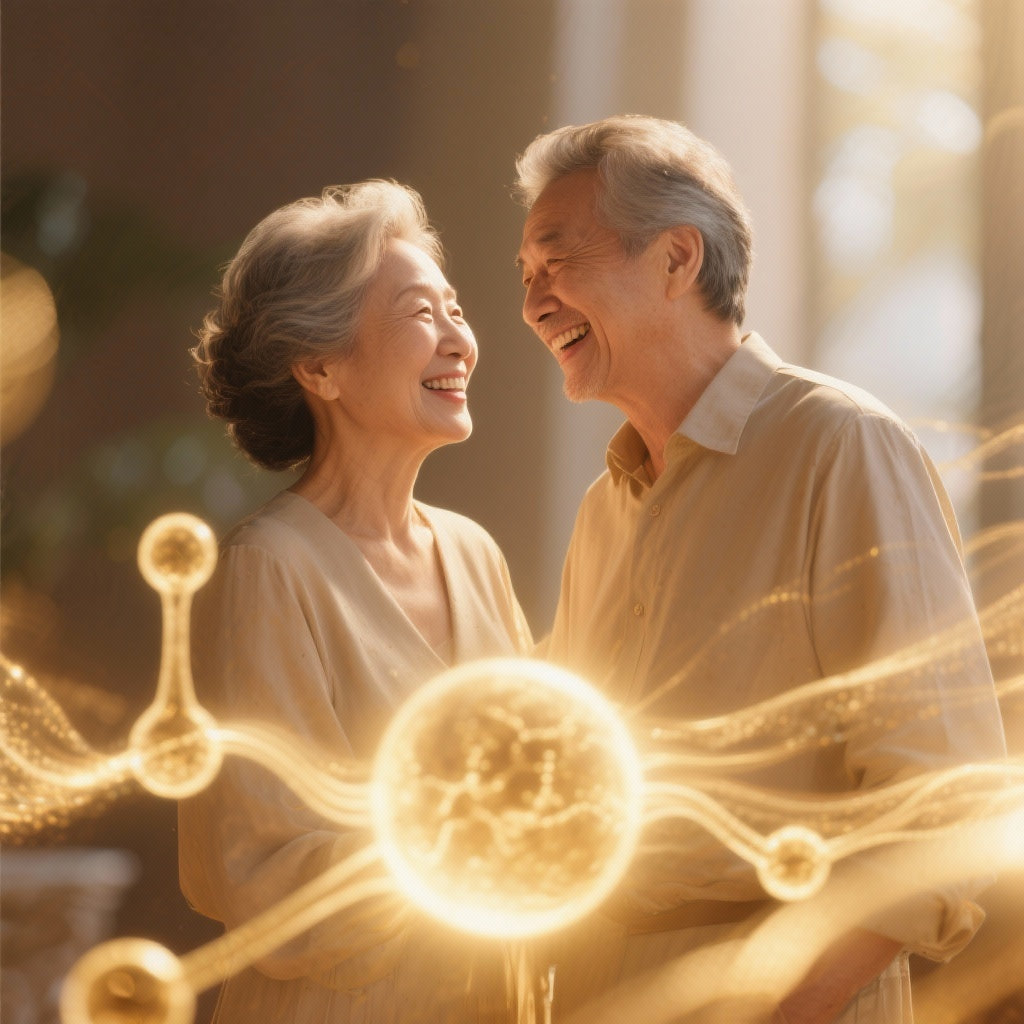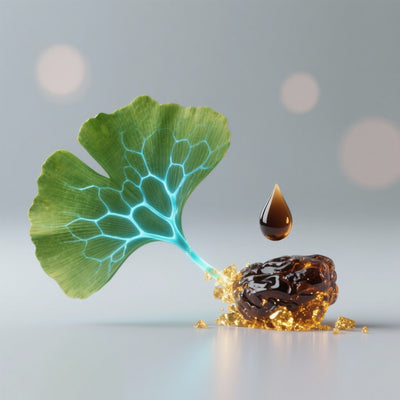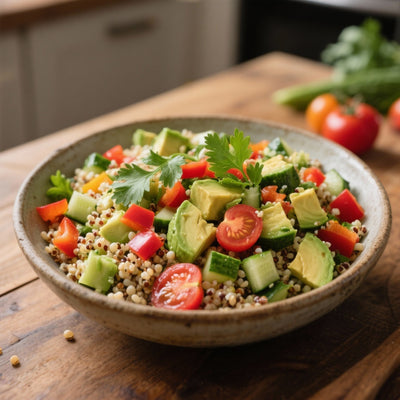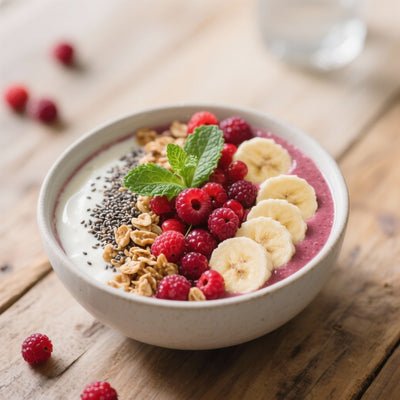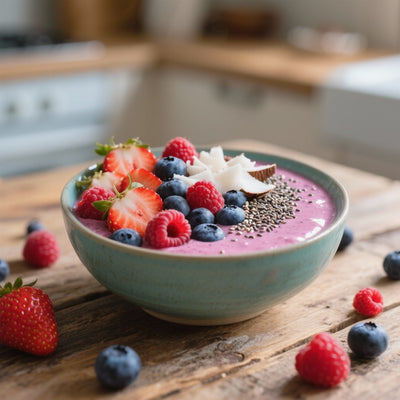What is DHEA? The youth hormone to revive your desire
Do you remember that boundless energy, that spontaneous desire that seemed inexhaustible in your youth? With time, it's common to feel that flame flicker. Fatigue sets in more quickly, moods fluctuate, and libido isn't what it used to be. If this sounds familiar, you're not alone. Behind these changes often lies a key player in our biology: DHEA .
Often called the "youth hormone," dehydroepiandrosterone (DHEA) is much more than just an age marker. It's a fundamental steroid prohormone that directly influences our vitality, mood, and, significantly, our sex drive. Understanding its role is the first step to regaining control and potentially reigniting that inner spark. In this article, we'll demystify DHEA, explore its direct link to libido, and discover natural strategies to support its balance.
What exactly is DHEA? The "Mother of Hormones"
DHEA is the most abundant steroid prohormone in the human body. Produced primarily by the adrenal glands (located just above the kidneys), it is considered the "mother" of many other hormones. Why? Because it serves as a biological precursor to the production of crucial sex hormones, including testosterone and estrogen .
Imagine DHEA as a raw material in a factory. The body, depending on its specific needs (age, sex, health status), draws on this reserve to produce the finished products it requires. In men, a significant portion will be converted into testosterone, while in women, it will contribute to the production of both types of hormones. It is this versatility that makes it so essential to our overall well-being.
The DHEA Life Cycle: Peak and Natural Decline
The path of DHEA in our lives follows a well-defined curve. Its production truly begins around age 7, reaches its absolute peak around age 25, and then begins a slow but inevitable decline. This is not a pathological process, but a normal part of aging.
Key statistic: It is estimated that our DHEA levels decline by about 10% per decade after the age of 30. By age 70, an individual produces only 10 to 20% of the amount of DHEA they produced at their peak.
This gradual decline is directly correlated with many signs associated with aging: decreased energy, reduced muscle mass, easier weight gain, and of course, a decreased sex drive. It is this correlation that has earned DHEA its nickname, the "youth hormone."
DHEA and Libido: The Direct Link to Your Desire
Sexual desire is a complex alchemy, but hormones are the main conductors. DHEA plays a central role in this symphony, for both men and women. By transforming into androgens (like testosterone) and estrogens, it acts directly on the mechanisms of libido.
Here's how it specifically influences your desire:
- Increased testosterone: Even in women, a small amount of testosterone is crucial for libido. DHEA is a major source of this testosterone, thus stimulating interest in sexual activity.
- Improved erectile function: In men, adequate levels of DHEA, via conversion to testosterone, are associated with better erectile function and greater satisfaction.
- Lubrication and comfort: In women, especially after menopause, DHEA can help maintain the health of vaginal tissues, reducing discomfort and promoting a more enjoyable experience.
- Mental well-being: By acting on mood and reducing feelings of anxiety, DHEA creates a mental environment more conducive to intimacy and desire.
Beyond Desire: The Multiple Benefits of DHEA
While its impact on libido is significant, reducing DHEA to this single role would be a mistake. Its influence extends to many other aspects of our well-being.
Energy and Vitality
Many people report feeling more vibrant and energetic with optimized DHEA levels. It helps combat chronic fatigue and improve physical stamina, giving you the endurance you need to make the most of your day.
Mood and Mental Well-being
DHEA has neuroprotective effects and acts on neurotransmitters in the brain. Studies have shown a correlation between low DHEA levels and an increased risk of depression or low mood. A healthy balance can contribute to an overall sense of well-being and mental resilience.
Potential "Anti-Aging" Effects
By supporting muscle mass, bone density, and skin hydration, DHEA helps combat the physical markers of aging. It helps the body maintain its structure and strength for longer.
The Crucial Balance: DHEA vs. Cortisol, the Stress Hormone
To understand DHEA, it's necessary to consider it in relation to its antagonist: cortisol , the well-known "stress hormone." Both are produced by the same adrenal glands from the same precursor. When subjected to chronic stress, the body massively prioritizes cortisol production to cope with the perceived threat.
This phenomenon, sometimes called "pregnenolone steal" or "cortisol steal," means that cortisol production comes at the expense of DHEA production. Chronic stress therefore literally depletes your reserves of this youth-boosting hormone, accelerating its decline and directly impacting your libido and energy levels.
Managing your stress is therefore not just a wellness tip, it is a direct biochemical strategy to preserve your youthful vitality and your desire.
How to Support Your DHEA Levels Naturally?
Even before considering supplementation (which must be supervised by a healthcare professional), there are powerful lifestyle changes you can make to support the natural production of DHEA and maintain your hormonal balance.
-
Stress Management: Your Top Priority
As we have seen, cortisol is the enemy of DHEA. Incorporate regular practices to calm your nervous system: meditation, yoga, heart coherence exercises, walks in nature, or any other activity that grounds you in the present moment. -
Restorative Sleep: The Key to Regeneration
It is during deep sleep that the body repairs itself and regulates its hormone production. Aim for 7 to 9 hours of quality sleep per night, in a dark and cool room. Insufficient sleep is a major stressor for the body. -
Strategic Nutrition
Your body needs the right building blocks to produce hormones. Focus on healthy fats (avocados, olive oil, nuts, seeds), quality protein, and complex carbohydrates. Since cholesterol is a precursor to steroid hormones, an adequate intake of healthy fats is essential. -
Moderate and Regular Physical Exercise
Physical activity, without going to extremes that generate stress, is beneficial. Resistance training (weightlifting) and high-intensity interval training (HIIT) of short duration are particularly effective in stimulating hormone production.
Supporting Your Vitality: The Role of Adaptogens and Minerals
In a holistic approach to hormonal balance, certain natural substances play a remarkable supportive role. Adaptogenic plants and resins, for example, help the body better manage stress, modulating the cortisol response and thus indirectly preserving our precious DHEA reserves.
Among nature's treasures, Shilajit stands out. This ancient resin, harvested in the Himalayan mountains, is an extraordinarily rich source of over 85 minerals and trace elements in ionic form, as well as fulvic acid. It is not a direct hormonal stimulant, but a powerful cell regenerator and a fundamental support for energy production at the heart of our cells (ATP).
By enhancing the body's overall resilience to stress and providing essential micronutrients for countless metabolic processes, Shilajit creates an environment conducive to healthy hormonal balance. It's a way to nourish the body, strengthening the foundations upon which your vitality rests.
DHEA Supplementation: What You Need to Know
It's tempting to take DHEA supplements directly to counteract its decline. However, this approach is not without risk. DHEA is a powerful hormone, and its supplementation should be considered a medical procedure.
- Mandatory consultation: Never take DHEA without consulting a doctor and undergoing a complete hormonal assessment. An inappropriate dosage can lead to side effects (acne, hair loss, mood disorders).
- Product quality: The quality and purity of supplements vary enormously. An unreliable source can be ineffective or even dangerous.
- A holistic approach: Supplementation will never replace a healthy lifestyle. It must be part of a comprehensive approach to managing one's health.
Conclusion: Rediscover Your Inner Flame
A drop in DHEA is a biological reality, but it's not inevitable. Understanding its crucial role in your energy, mood, and especially your libido is the first step to taking action. By adopting a proactive approach focused on stress management, quality sleep, a nutritious diet, and appropriate physical activity, you give your body the best chance of preserving this precious hormonal balance.
Supporting your body with natural allies like Shilajit can complement this approach by strengthening your vitality at a fundamental level. It's not about seeking a miracle cure, but about building, day after day, a lifestyle that honors your biology and allows you to cultivate that inner flame, at any age.
Want to learn more about the secrets of well-being? Explore our articles on health information or discover healthy recipe ideas to bring vitality to your plate.
